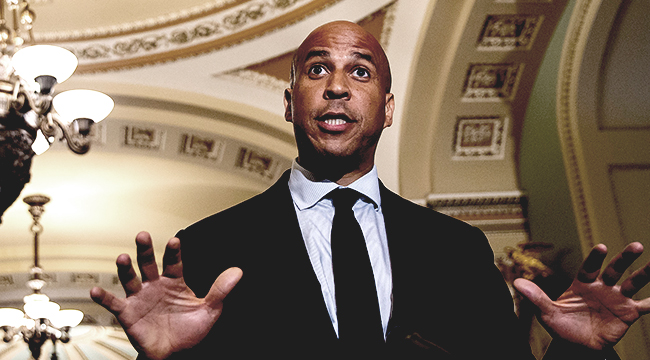
When New Jersey Senator Cory Booker announced on February 1st that he was running for president, the field of Democratic candidates wasn’t very crowded and his optimistic announcement, in which he discussed American courage and his hopes for the future, made a splash. But since his announcement, the likes of Bernie Sanders, Elizabeth Warren, Amy Klobuchar, Jay Inslee, Pete Buttigieg, and a couple of others announced they were running for president as well. By April, Booker was pushed into the background (except for the news about his famous girlfriend).
Until now. Today, May 6th, Booker released a multi-part, comprehensive gun control plan, meant to reduce and prevent gun violence across the U.S. It is by far the most far-reaching gun control proposal seen thus far among presidential candidates.
In a statement, the presidential hopeful said, “My plan to address gun violence is simple. We will make it harder for people who should not have a gun to get one.”
His plan promises to do three things, according to his Medium post:
- Keep guns out of the wrong hands
- Hold gun manufacturers accountable
- Bring the fight to the NRA.
After years of little to no federal action to prevent gun violence, it’s easy to become jaded by promises such as those. So how is Booker going to do it? We break it down for you.
What is Booker proposing?
Booker’s gun control plan is broken down in 14 parts, and while there are several recognizable proposed measures, such as an assaults weapon ban, there are also some pretty radical measures that go beyond what any Democrat has proposed.
Some of the key proposals include:
- Create a federal gun licensing program which would require background checks, fingerprinting, gun safety courses, and an interview to be granted a five-year license in order to purchase and use firearms
- Regulate gun manufacturers via the Consumer Product Safety Commission, which will create safety warnings and issue recalls for faulty firearms
- Fund research on gun violence as a public health issue
- Institute limits on gun purchases: only one handgun per person per month
- Ban assault weapons, high-capacity magazines, and bump-stocks (a tool that increases the firing capacity on semi-automatic weapons, effectively turning them into fully automatic firearms)
- Close key gun purchase loopholes like the “Boyfriend Loophole” and the gun show loophole, which have allowed people like domestic abusers and individuals on the terrorist watch list to own firearms
- End legal immunity for gun manufacturers, which prevents them from being held accountable for mass shootings and other gun violence
Booker explained that he’ll accomplish these goals through a mix of executive action, legislation, and grant programs.
Does this mean no more Second Amendment?
Absolutely not. The Second Amendment will remain intact, as will the ability to own firearms — so long as you’re deemed qualified. Gun-owner and gun-manufacturer advocacy groups such as the National Rifle Association will claim otherwise, especially when it comes to Booker’s licensing proposal. The NRA claims that “Gun registration and gun owner licensing wouldn’t prevent or solve crimes” and that gun licensing is part of a “three-part plan to ban” gun ownership outright.
According to Vox, the research tells a different story. In Connecticut, where they instituted gun licensing, researchers saw “a 40 percent drop in gun homicides and a 15 percent reduction in handgun suicides. In Missouri, researchers looked at the aftermath of the state repealing its handgun permit-to-purchase law — finding a 23 percent increase in firearm homicides but no significant increase in non-firearm homicides, as well as 16 percent higher handgun suicides.”
Further, in Massachusetts, which has a gun licensing program similar to what Booker is proposing, 95 percent of applicants are approved for gun ownership, so this isn’t a means to take away the right to bear arms.
Why gun control?
Booker’s political career started in Newark, so it’s not exactly surprising that the first policy he has released is related to gun violence. The northern New Jersey city has been plagued by gun violence and gun deaths, with as many as 105 gun-related homicides in the city in 2016. But after a gun buyback program in 2017, the city experienced a “historically low” gun homicide rate the following year. In many ways, Booker’s adopted hometown has shaped his strong support of gun control.
On a broader scale, gun violence in the U.S. is out of control. In the last two weeks alone, we’ve been witness to a mass shooting at a San Diego synagogue and a shooting at the University of North Carolina Charlotte, the latter of which barely made a splash in the national consciousness. 2017 saw the highest number of gun deaths in 40 years, 1,000 more deaths than in 2016. Per the New York Times, “the rate of gun deaths in 2017 also increased slightly to 12 deaths for every 100,000 people, up from 11.8 per 100,000 in 2016.” And that’s to say nothing about the psychological effects of being home to one of the highest rates of gun violence in the entire world.
All this in a country where about 80 percent of people support measures like universal background checks. What Booker is proposing might be politically risky, what with the vast political power of the NRA and their deep pockets. But with 61 percent of Americans stating that they believe that gun control policies should be made more strict, perhaps this will help the upstart candidate rise above the fray.
